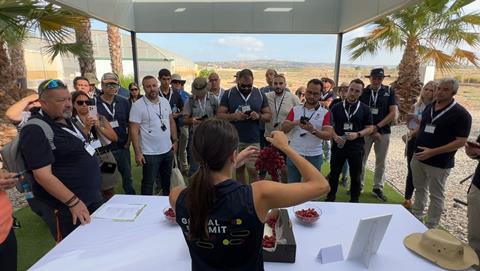Breeder presents the next generation of healthy and flavourful varieties at its Global Summit in Murcia
More than 200 producers from around the world attended SNFL’s Global Summit this week in Murcia to learn about the next generation of table grapes coming through the breeder’s innovation pipeline.

The three-day event included commercial field visits; tours of trial blocks at SNFL’s Innovation Centre, during which delegates could sample new varieties; and a half-day conference programme highlighting the opportunities and challenges facing the table grape industry.
More than 300,000 hybrids have been generated by SNFL’s grape breeding programme since its launch in 2015. Chief innovation officer Josep Estiarte explained that the focus was on developing varieties with consumer appeal, high levels of disease resistance, innovative flavour profiles and elevated antioxidant levels.
During the field visit, delegates had the opportunity to sample a selection of the most promising hybrids, some of which are already being fast-tracked for commercial development.
The event also served as the backdrop for the presentation of the new corporate identity of the merged breeding programmes of SNFL and International Fruit Genetics (IFG) following the approval of IFG’s acquisition by AMFresh, together with EQT Future and Paine Schwartz Partners earlier this month.
Bloom will focus on cultivating a spectrum of healthier, more sustainable and flavourful fruit offerings, harnessing the synergy of traditional breeding practices and cutting-edge agri-tech solutions.
Outlining his vision for Bloom, CEO Kenneth Avery said the key to increasing grape consumption around the world lay in guaranteeing consumers the same, consistently good product every time while providing producers with varieties that are easy to grow, with good disease resistance and consumer appeal.
The afternoon conference, moderated by Chris White of Fruitnet Media International, provided a more in-depth exploration of some of the key issues facing the industry today. Father and sons Juan, José and Iván Careño spoke of advances in disease resistance, noting that soon 100 per cent of new cultivars will have in-built resistance, transforming grape production in much the same way as the introduction of the new wave of seedless varieties had done previously.
Jose Vottero, managing director of Fresh Fruit-X, provided a comprehensive overview of new opportunities in the South East Asian market, while Ray Wang of Shanghai-based importer and distributor Riverking gave an expert analysis of what Chinese consumers want and expect from new varieties.
The programme also featured Dr Jose Abellán whose presentation on the beneficial impact on health of a Mediterranean diet paved the way for a wider discussion on the benefits of breeding table grapes with higher antioxidant levels.
Dr Iwona Janik and Hazel Hunt of the UK’s Ethical Food company outlined the opportunities for organic grapes. Grapes currently represent just 3 per cent of organic fruit sales in the UK, with limited availability – particularly in the May/June and October-December windows – curbing the growth potential in this segment.
The programme concluded with a round-table discussion on how to help consumers make better choices featuring Frans Gelderblom of Woolworth, Desmond Jas of Olympic Fruit and AMFresh’s Patricia Sagarminaga.
The panellists discussed whether moving away from marketing grapes by colour and instead separating them by flavour profile could better reflect the sophistication of the new varieties on offer and help generate more excitement in the produce aisle.
All of them agreed that delivering a consistently good product and improving connectivity across the whole supply chain, from breeder to retailer, were essential to underpin the future growth of the category.



